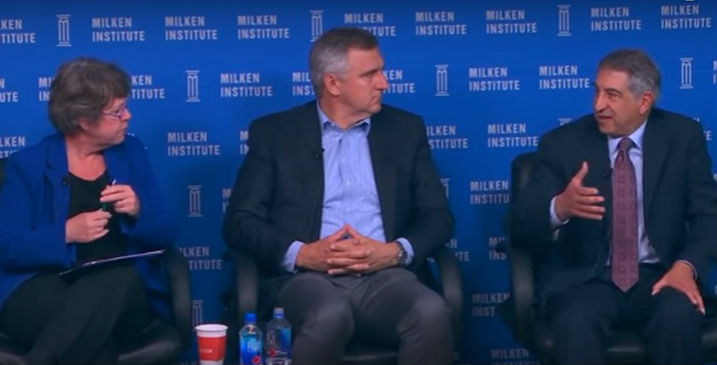 The national “Moonshot” initiative is repeatedly making news headlines as the $1 billion effort designed to eliminate cancer has groundbreaking potential. Led by Vice President Joe Biden, the effort is focused on accelerating research and making more therapies available – and blood cancer patients have much to gain.
The national “Moonshot” initiative is repeatedly making news headlines as the $1 billion effort designed to eliminate cancer has groundbreaking potential. Led by Vice President Joe Biden, the effort is focused on accelerating research and making more therapies available – and blood cancer patients have much to gain.
I recently joined an expert panel at the annual Milken Institute Global Conference, “Promise of the Cancer Moonshot,” to share The Leukemia & Lymphoma Society’s (LLS) perspective about what needs to be done to move this effort forward.
I was in good company.
Other speakers included Anna Barker, a professor and director of Arizona State University's Transformative Healthcare Networks; Michelle Bennett, director, Center for Research Strategy, National Cancer Institute; Robert Bradway, chairman and CEO, Amgen; and Isla Garraway, associate professor and director of research at the University of California, Los Angeles. The panel was moderated by Kathy Hudson, deputy director for science, outreach and policy, National Institutes of Health.
In several conversations with Biden’s staff since the Moonshot was announced, we have had the opportunity to share key LLS initiatives and areas of expertise that match with the Moonshot goals. A key area of focus for both LLS and Biden’s team centers on enhancing patient access and care, facilitating collaboration and making more therapies available to patients.
As a panelist, I emphasized the importance of putting patients at the center of everything we do. I was pleased to have the opportunity to share that LLS recently brought a group of acute myeloid leukemia (AML) patients to talk to officials at the U.S. Food & Drug Administration about their preferences for the benefits and risks of treatment. The visit was a first step in LLS’s Patient Preference Study, which we’re funding at Johns Hopkins, to help ensure that the FDA and drug manufacturers better understand patient perspectives and include their preferences in the drug development process.
Participants in clinical trials are too often thought of as “subjects” and many end points set forth in trials have nothing to do with what’s personally important to patients. It’s no wonder only five percent of cancer patients enroll. We need to think differently about how we design these studies and engage patients upfront so their input can be incorporated into the initial design.
Researchers also need to better recognize the importance of “real world” data, which doesn’t always match up with public-facing statistics. For example, while studies have shown that more than 90 percent of chronic myeloid leukemia patients go into extended remissions, the actual number of individuals now achieving that is considerably lower.
The panelists all agreed on the need to knock down barriers to data sharing. I noted the importance of collecting data from studies that will never be published but that yield valuable information. There is often great value in experiments that fail and we need to find a way to unlock those notebooks.
The Moonshot initiative could also bring an advantage by using its convening power to bring together stakeholders in innovation – academic research, biotech and pharma, regulatory agencies, payers, patients and physicians. The research industry doesn’t do teamwork particularly well and acting as a team and aligning our goals and objectives would no doubt accelerate the rate at which new therapies are developed.
Watch the full one-hour program here.
Louis J. DeGennaro, Ph.D., is CEO and president of The Leukemia & Lymphoma Society
